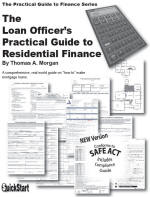|
|
||
|
January 21, 2010 - "News You Can Use" Having trouble reading this document? Download on-line at http://quick-start.net/mortgageprofessional.htm |
||
|
HUD's Mortgagee Review Board Terminates or Fines over 200 Lenders What are lenders getting fined for?
4. Community Home Lending, Inc., Birmingham, AL [Docket No. 09-8041-MR]
Action:
July 1, 2009, settlement agreement with Community Home Lending, Inc.'s
(Community) requiring civil money penalty of $11,500 without admitting
fault or liability. 7. Great Country Mortgage Bankers, Corp., Coral Gables, FL [Docket No. 09-9618-MR]
Action:
June 3, 2009, timmediately suspended Great Country Mortgage Bankers
Corporation's (Great Country) FHA approval pending the outcome of a HUD
review and any ensuing legal proceedings. 10. Mortgage America Bankers, LLC, Kensington, MD [Docket No. 08-8072-MR]
Action:
On September 18, 2009, the Board entered into a settlement agreement
with Mortgage America Bankers' (Mortgage America) requiring the payment
of a civil money penalty of $10,000 without admitting fault or
liability.
15. World Alliance Financial Corporation (formerly Vertical Lend, Inc.), Melville, NY [Docket No. 07-7036-MR]
Action:
On April 3, 2009, the Board entered into a settlement agreement with
World Alliance Financial Corporation's (World Alliance) requiring the
payment, without admitting fault or liability, of a civil money penalty
in the amount of $13,000. |
SAFE ACT Training - NMLS Approved
Loan Officer/Processor Training - Books, Manuals and on-line Training - 2009 Versions Now Available!
Production Managers - FREE Training Site for basic introductory information
Looking for Lending Policies and Procedures?Complete customizable templates
Red Flag ID Theft Program Required by 5/1/09
OnlineLO - Engage web customers to get them to apply online
|
|
|
MINI EAGLE - "Gone, Baby, Gone"
The stated termination of the mini eagle program has caused confusion and some loss as brokers who are late to the "I want to get FHA approved" party find that FHA's guidelines exclude them effective 1/1/10. The proposal was simple. The problem is that as of 1/21/10 HUD has yet to disseminate guidelines for the process, although the details are enunciated in the Federal Register. According to several of our clients, HUD continues to process applications received prior to 12/31/09.
Executive Summary
|
||
|
We hear this ALL the time, because our templates are written in Office format. Many people have not gotten used to the new "intuitive interface" - meaning they have to guess where their favorite function keys might be. Plus, it's expensive. Every few years we like to remind people that there is an alternative. Depending on the version it might even be FREE!! Visit www.openoffice.org to download the shareware version SUN Microsystem's competitive product. It works GREAT. |
||
|
Are You Pushing Your Customers Away? - The Rules of Engagement
Despite the amount of money mortgage companies, banks and credit unions spend on the development of web sites, many of these firms seem oblivious to any measure of effectiveness. If a customer fills out the "please contact me later" form on the company's site, that is considered a measure of effectiveness. But the reality is that only 7.3% of all applicants actually complete their mortgage application online. Which is too bad. Based on a 2007 survey by Deloitte, 61% of customers who had a positive web application experience highly recommended their lender. Compare that to only 41% of telephone customers.
The key is engagement. In the same way that the live loan originator wins a customer by developing rapport, the longer a customer stays with a web loan officer, the more likely he or she is to apply. In this context, if you were shopping for mortgage information, what would you do if the only information the site yielded was a set of interest rates, and a static form requesting personal information to be "pre-qualified"? In a survey of 910 mortgage or banking sites, following the "get more information" link resulted in a static application form (or a simple contact form) 903 times.
We know this about Web customers:
Web customers don't want to fill out a form and have someone get back to them. Web customers resent being given rate information, and then being told that the information doesn't apply to them Web customers would rather NOT talk to a loan originator. Unfortunately, this is their only alternative 99.4% of the time. UNLESS you have a tool for engagement.
Engaging a customer means answering the 5 questions every borrower asks:
What's the payment? How much can I afford? What are the closing costs? What types of loans are best for me? Giving a borrower this information, without creating an obligation to apply, creates a web borrower who completes the application online within 24 hours (16% of visits), or returns at least 6 times and completes an application (61% of visits).
For a demonstration of a product that will do this for you, visit www.onlinelo.com and see the virtual loan originator.
|
||
|
QuickStart Quality Control Systems and Mortgage Training Programs 1 Research Court, Suite 450 Rockville, MD 20850 301-738-7031 - Office 877-91-TRAIN - Toll Free 877-729-4033 - Fax
|
|
|
| © 2010 QuickStart//MortgageManuals.com/Lendertraining.com | ||



